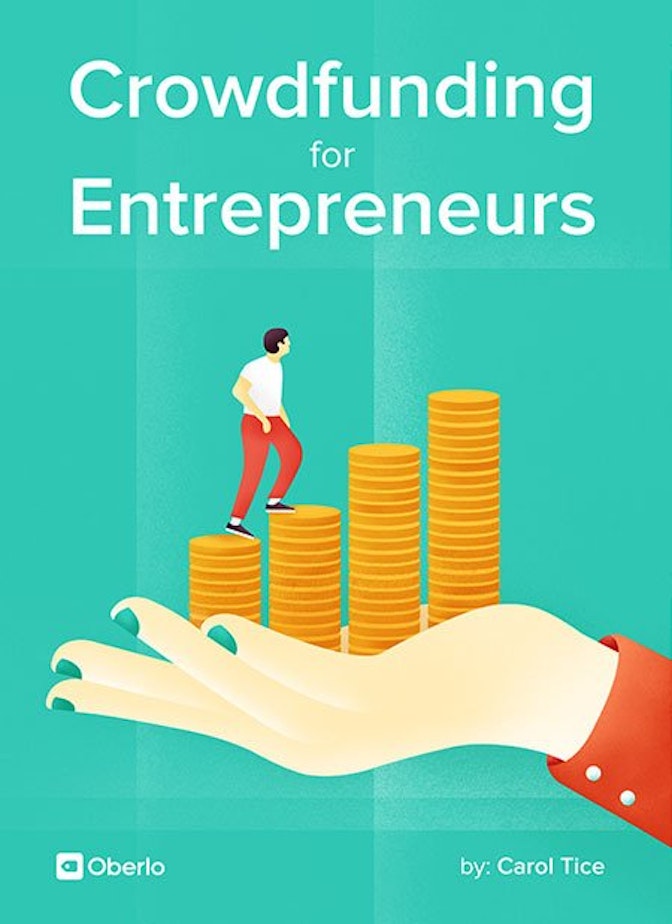Creating a top-20 list of the best crowdfunding sites isn’t easy. There are many ways to evaluate who’s the biggest or best. So there isn’t one, simple answer to the question, “What is the best crowdfunding website?”
There are hundreds of rewards-based crowdfunding platforms, and more launch each year. For instance, here’s a list of the 43 U.S.-based equity crowdfunding sites regulated by FINRA (the Financial Industry Regulatory Authority).
This top 20 list features a mix of all three main types of the best crowdfunding sites for entrepreneurs to use: rewards, equity, and crowdlending. Among the metrics that made a platform stand out and earn inclusion:
- Total funded over time
- Average amount raised per campaign
- Number of successful campaigns
- Percentage of campaigns that met their fundraising goal
- Average days to successful funding
- Top platform in a major country
- Fast growing crowdfunding sites
[highlight]When you’re looking at choosing a crowdfunding website, be sure to research whether the platform does many campaigns in your industry. Some do only technology, or movies, while some take nearly all comers, from e-commerce stores to manufactured goods.[/highlight]
Statistics below are as of fall 2018, with all figures rounded off. You’ll see that some platforms share a lot of data about their success, while others are less transparent.
This list groups crowdfunding platforms by type, with the top two players appearing first. Beyond there, my list of the best crowdfunding sites are listed alphabetically within each category.



Rewards-Based Crowdfunding Sites
Kickstarter (rewards only)
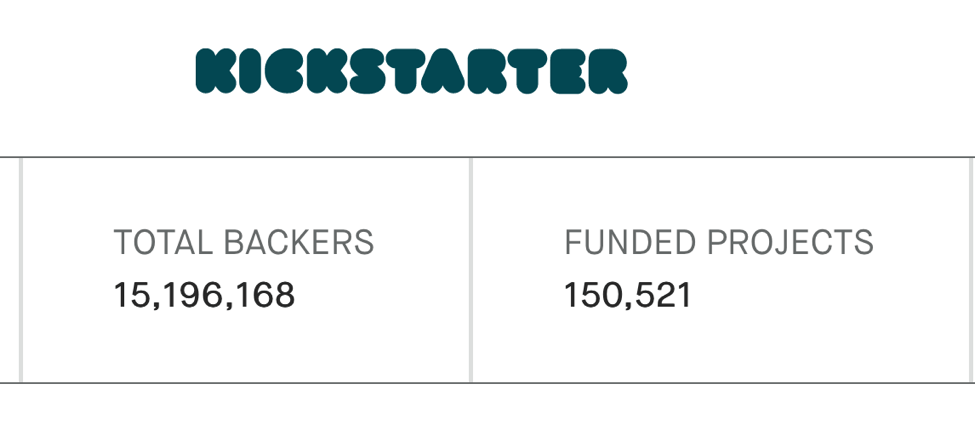
Founded in 2009, Kickstarter has seen over 150,000 successful projects funded and $3.43 billion pledged to its successful campaigns (see all its stats here).
→ Click Here to Launch Your Online Business with Shopify
Why use Kickstarter? Many startup owners think Kickstarter is the best of the crowdfunding sites—but note that only 36% of Kickstarter campaigns are successful. That’s a fairly low figure compared to many other crowdfunding sites.
Wondering how Kickstarter works? Your goal on here is to stand out from the crowd and get into one of their featured categories. Many backers rely on these “best of” lists for guidance, so you want to appear here.
Check out some of the cool projects that appear when I check the Kickstarter team’s “Projects We Love” for U.S.-based tech campaigns:
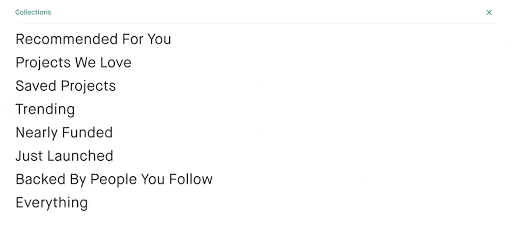
Most successful projects raise under $10,000, Kickstarter says, though a growing number of successful campaigns are in the $100,000–$10 million range. As I said, despite being the brand name in crowdfunding sites, it has a fairly low success rate: just over a third of all campaigns are funded.
Bonus to checking out Kickstarter: It’s a great place to find cutting-edge new products you might want to sell online.
Fees
In the U.S., Kickstarter collects 5% of funds collected on successful campaigns, plus a processing fee of 3% + $.20 per pledge. Pledges under $10 have discounted fees.
Features
Crowdfunding on Kickstarter is “all or nothing.” Translation: If your business doesn’t reach its goal, you get zero money. So think carefully about what’s realistic for you, and don’t overreach! Kickstarter has a handbook to help you.
On Kickstarter, 13% of campaigns fail to get a single pledge—but 78% of campaigns that raised 20% or more of their goal succeed. Takeaway: Get initial backers fast, so your campaign shows early progress.
Recent Success
German company The Outsider Team’s FLECTR 360 Omni bicycle reflector system, which exceeded its $4,095 pledge goal by nearly 2,000%, raising $82,000.
Indiegogo (rewards & equity)
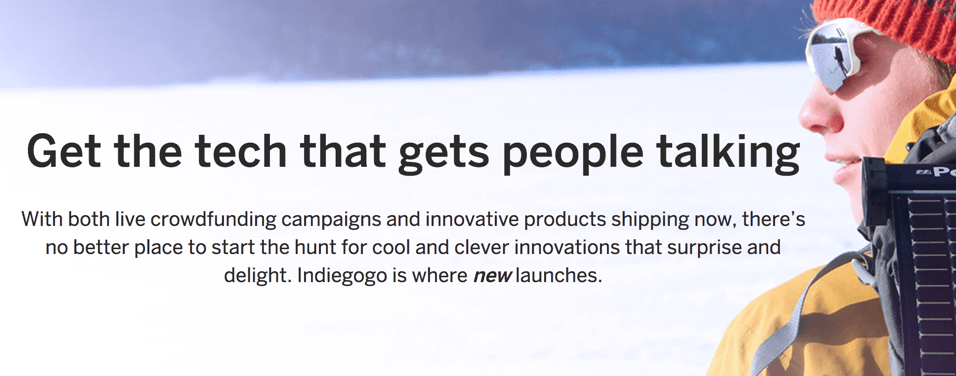
Founded in 2007, Indiegogo reports $1.5 billion raised on over 650,000 projects (see more stats here). Indiegogo also launched a program for Chinese entrepreneurs in 2015, which has raised nearly $100 million. As you can see from the Indiegogo home-page header, tech is a big focus here:
Fees
Fees are 5% plus processing fees via Stripe of 3% + $.30. As with most platforms, there are no fees charged if you fail to make a fixed all-or-nothing funding goal.
Features
Indiegogo has a lot of moving parts. It’s unusual among crowdfunding websites in offering the option to keep whatever you raise, even if you fall short of your goal (known as “flexible funding”). You can also run all-or-nothing campaigns (“fixed funding”).
Like archrival Kickstarter and many other of the top crowdfunding sites, they offer a how-to handbook. Other unique features:
- InDemand—With this feature, if you make your fundraising goal, you can keep going and solicit more backers indefinitely.
- Marketplace—For product makers, after your startup’s campaign finishes and your product is ready, you can sell it on Indiegogo’s Marketplace. Hello, great exposure!
- Equity—Since 2016, Indiegogo has offered equity crowdfunding through a partnership with equity platform Microventures (see below for more on them). Their joint crowdfunding platform, First Democracy VC, has seen 40 successful campaigns.
- Transfer—If you’ve done a successful campaign on other crowdfunding websites, you can switch over to Indiegogo to raise more.
Indiegogo accepts campaigns in three major buckets: Tech & Innovation, Creative Works, and Community Projects.
Recent Success
Would you believe a toothbrush for dogs? Bristly of Los Angeles raised over $600,000 from nearly 3,000 backers, a 3,900% overachieve. That was a follow-on raise for Bristly—the startup transferred to Indiegogo after raising $466,000 elsewhere.
Crowd Supply (rewards only)
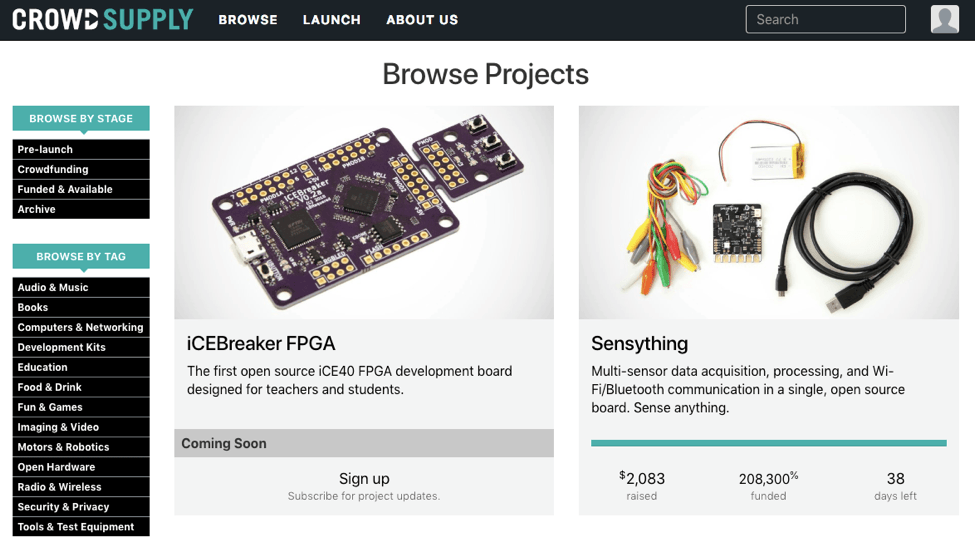
Technology startups find a home here. Crowd Supply’s mission is “to bring original, useful, respectful hardware to life.” Translation: open-source, code-based gadgets are faves.
The average raise on Crowd Supply is $66,000. In contrast to Kickstarter, a whopping 70% of projects are successfully funded (it’s all or nothing). Crowd Supply also boasts that 100% of its projects have delivered their goods to backers, a claim Kickstarter and Indiegogo can’t make.
Fees
Crowd Supply has a sliding-fee scale depending on services used, ranging from 5% to 15%. Card processing fee is 2.9% + $.30.
Features
Here’s something different: With Crowd Supply’s pre-launch tab, your project can get exposure ahead of your opening date and capture potential backers’ emails. You can also take additional pre-orders after your campaign funds.
One trend on this crowdfunding platform is setting a very low goal—think $1—so that you can easily exceed it by a large percentage and look impressive. This can also be an indicator that the campaign is primarily for market research. Find more tips in their guide.
Recent Success
Michigan startup Alphamax raised almost $78,000 on a $15,000 goal for its NeTV2, an open-source video-development board.
Fundable (rewards & equity)
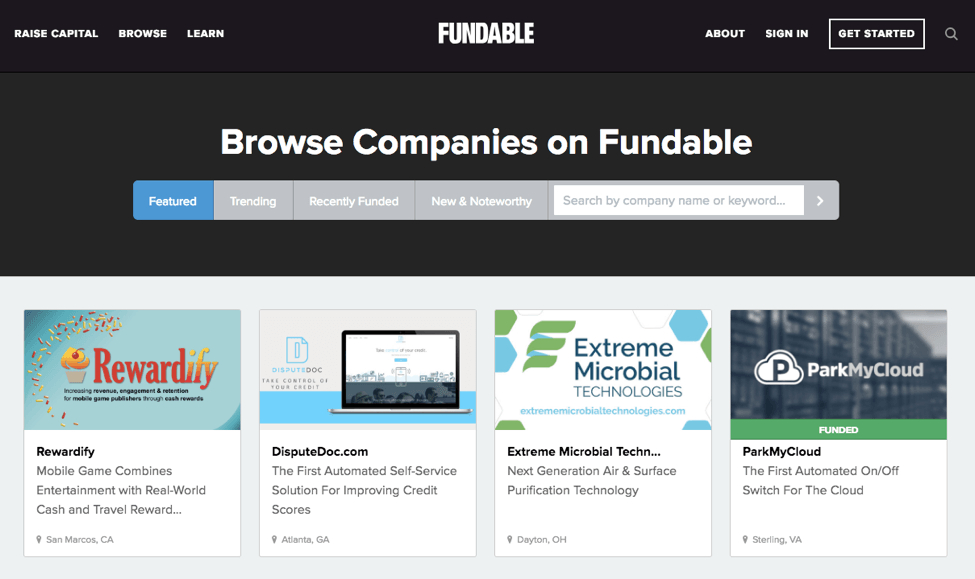
U.S.-only Fundable has seen $444 million committed in campaigns, with a typical rewards campaign raising $50,000 or less. Though it offers both rewards-based and equity crowdfunding, recent campaigns were mostly equity.
Thing to know: Fundable is part of the Startups.co family of sites, which includes Bizplan, mentor site Clarity, and sitebuilder Launchrock—so they’ve got resources and connections.
Fees
No percentages here—it’s a flat monthly fee of $179 per month and up from when you launch (depending on services used). Then, whatever you raise is yours to keep, beyond their merchant-processing fee for rewards campaigns of 3.5% + $.30.
Features
The site has a decent number of learning resources. Industries run the gamut from food and fashion to media and tech.
For equity crowdfunding, Fundable keeps the business-plan info hidden. Only registered investors can read it. This gives a feeling of exclusivity, but it could also be a barrier to exposure.
Recent Success
A hot recent equity crowdfunding campaign here was a $10 million raise for North Carolina startup Olaeris’ AEVA unmanned aircraft (billed as a “helicopter replacement”).
Ulule (rewards)
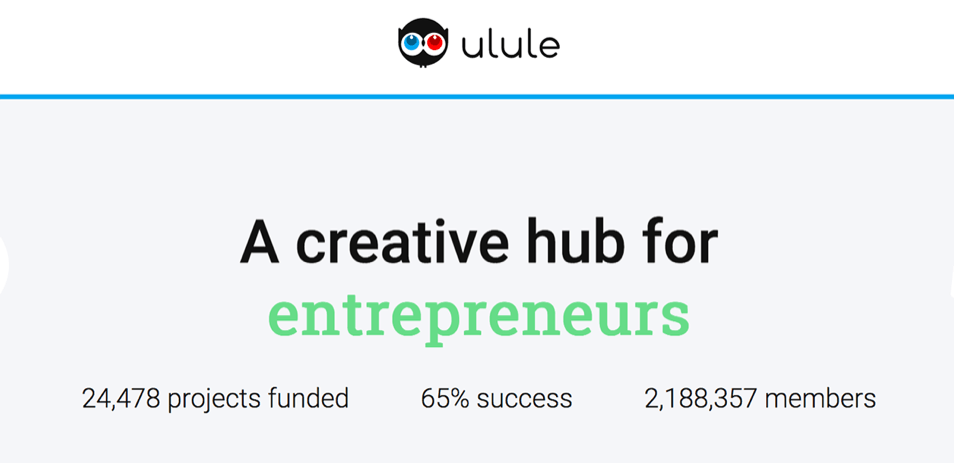
World, meet your rewards-based crowdfunding platform! Since 2010, Ulule (said: You-loo-LAY) has helped startups, creators, and more in 193 countries to raise money online.
To use Ulule, you need to be 18 and able to accept money in euros, U.S. or Canadian dollars, Swiss francs, or British pounds. Over 24,000 projects have funded, with Paris-based Ulule claiming a 65% success rate.
Fees
You pay only if your all-or-nothing campaign succeeds. Fees beyond these are complex due to the many currencies Ulule works with. There’s a 5% “success fee” if you’re in euros. Amounts over $100,000 cost you progressively less the more you raise.
Features
One feature international entrepreneurs appreciate: Ulule automatically picks up on what language visitors’ browsers use, and then seamlessly translates your campaign into the right language for each user. No hunting for a ‘translate this’ button!
Key thing: Ulule’s motto is “Make good things happen.” Companies that promote their social mission thrive on Ulule—and compete with charities and individuals who fundraise here, as well.
Recent Success
Average raise on Ulule is modest, as with B-Wom Technologies of Barcelona, whose mobile app for women’s health brought in $10,000.
Patreon (recurring rewards)
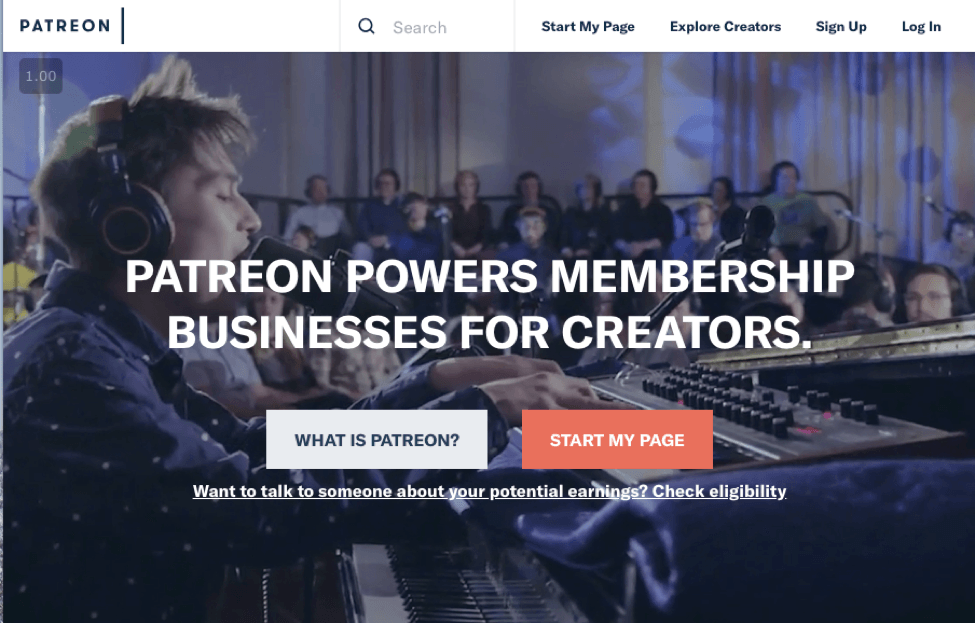
Don’t want a high-pressure crowdfunding campaign with a deadline? Patreon may be for you, if you create something your startup could release in installments or monthly updates.
The model here is completely different from most other crowdfunding sites. Entrepreneurs fundraise by asking “patrons” to commit to recurring monthly payments—and some make a healthy income doing it.
Patreon’s motto: The platform “powers membership businesses for creators.” So as you’d expect, creative projects from comics to crafts are big here.
Fees
Fees to Patreon are 5% monthly. In 2017, Patreon stopped charging entrepreneurs processing fees—they’re charged to patrons instead. This saves on your fees, but some creators worry it might discourage patronage.
Features
As with other types of rewards-based crowdfunding, Patreon users create a crowdfunding campaign page with tiers of rewards for supporting their products or projects.
Notably, technology isn’t a big category here—but podcasts, comics, and education projects are. On Patreon, your campaign page is constantly updated as you add new items.
Recent Success
Gina Häußge of Germany brings in $5,770 a month to support her work on open-source 3-D printing interface the OctoPrint, which she offers the makerspace community for free.
Equity Crowdfunding Platforms
StartEngine
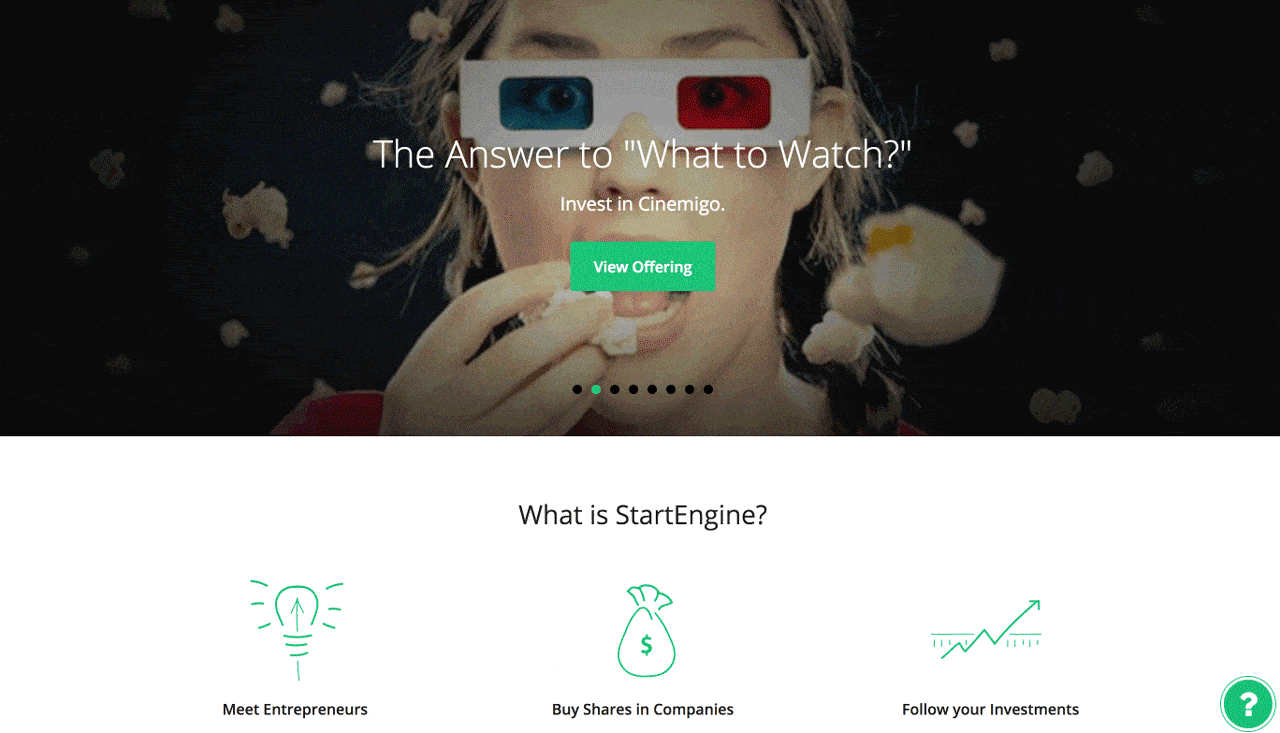
Welcome to the site many think wins the ‘best crowdfunding websites’ award for crowdinvesting. The video above gives you a peek at some of the startups raising cash on StartEngine in early fall 2018. Note how they promote their favorite offerings big-time in the site header, and also the snappy, one-line descriptions of what each company offers that’s unique.
You can raise money three ways on StartEngine: regulation crowdfunding up to $1 million, small IPOs up to $50 million, and through initial (crypto)coin offerings (ICOs), the cryptocurrency industry’s equivalent of an IPO. StartEngine offers all forms of equity, including private stock, SAFEs, convertible debt, and revenue share.
About 200 companies have received $62 million on StartEngine, and deal volume is skyrocketing: In fall 2018, there were 113 offerings in progress. Industry trade VentureBeat reports that StartEngine is the top platform for volume of equity crowdfunding campaigns launched.
Fees
StartEngine takes a 6%–10% cut depending on payment method investors use and country of origin, due only if you get some funding.
Features
StartEngine has a “test the waters” campaign phase. Campaigns are all or nothing.
As is typical for equity crowdfunding websites, StartEngine runs campaigns with a stated goal range, rather than a flat figure. StartEngine offers a variety of services, from free, one-day how-to workshops to paid marketing help.
Here’s a lure to investors: StartEngine operates a secondary market where investors in startups can try to resell their equity shares to accredited investors.
Recent Success
On a fall 2018 browse, the cryptocurrency startup Ridecoin had $344,000 in reservations for investment in its “test the waters” phase.
WeFunder
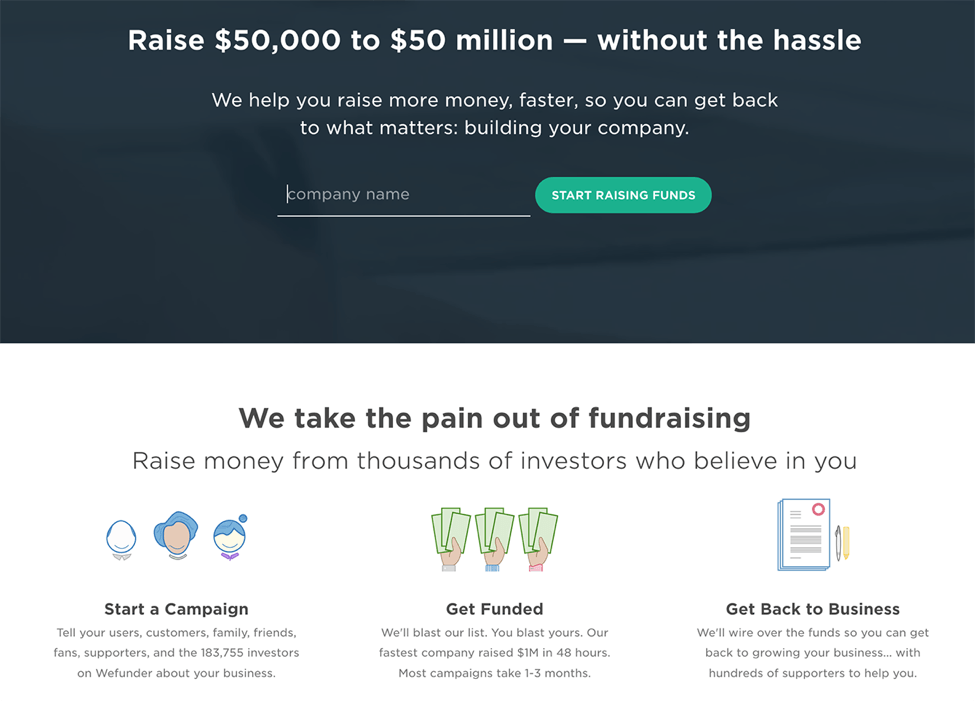
Billing itself as “Kickstarter for investing,” WeFunder has midwifed $65.5 million for 207 startups. The majority was for campaigns under $1 million, but $21 million was Reg D campaigns, or fundraising from accredited investors. WeFunder has done one small IPO.
Fees
Reg CF carries a small fee (up to $75), plus 7% of what you raise. With Reg D, WeFunder collects a profit of between 5% and 20% for investors when their startup has an ‘exit’ event, such as a subsequent fundraising.
Features
A rarity among crowdfunding sites, WeFunder runs its own investment fund, which invests in all the platform’s startups. Individual investors pool their money into the WeFund. In fall 2018, 55 campaigns were in progress.
The mix of categories on WeFunder is technology of all stripes, retail, food, alcohol, and infrastructure.
Recent Success
Scrap Connection, a recycling-industry software solution from the Netherlands, raised $971,000.
CrowdCube
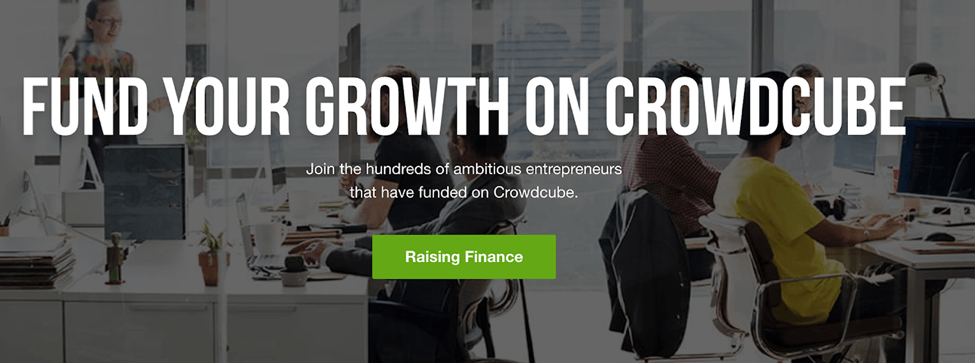
CrowdCube is the UK’s crowdfunding site leader, with over £500M raised. Notable: its average campaign length is a speedy 22 days.
They’ve had nearly 740 successful raises that averaged £651,000. The platform reports over 50 of those companies have done a second CrowdCube raise.
Fees
CrowdCube’s ”success fee” is 7% excluding the VAT, plus processing fees between .75% and 1.25%.
Features
CrowdCube has a calculator you can use to see averages for past campaigns in your industry, to help you set realistic fundraising goals. Once you complete your campaign, join CrowdCube’s Funded Club to network with other successful entrepreneurs and access partners including Amazon Launchpad, a site that features startups’ products.
Transparency alert: CrowdCube states what size ownership stake startups are offering, which few sites disclose.
Recent Success
Growing London promo company Awesome Merchandise offered a 7.6% equity stake, exceeding its $350,000 target to raise $464,000 and counting from 814 investors.
Crowdfunder
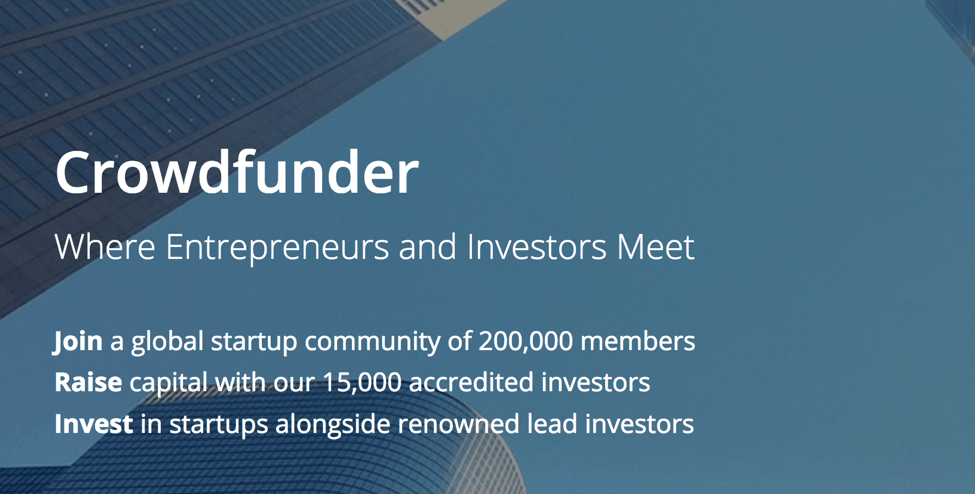
This platform is where the hot, connected startups come to raise. Crowdfunder warns entrepreneurs straight up that you should already have customers or investors or have been through a business incubator. It’s not a place for an untried team with an idea as opposed to a finished product.
One other caution: Crowdfunder’s site seems a bit out of date. Press releases end in 2016, and data is from that year, too. What we know: At that point, Crowdfunder had over 100 deals funded, at an average deal size of $1.8 million, for $160 million total. Requests for fresh data went unanswered.
Fun fact: Crowdfunder does not vet applicants. Instead, they look for startups that already have a lead investor in place who’s done the due diligence.
The platform has raised nearly $5 million in capital itself, Crunchbase reports, and fellow equity platform Seed & Spark raised $2 million in seed money here. Cryptocurrency and real estate deals are hot.
Fees
For $299 per month and up, you create a “private room” to showcase your crowdfunding campaign. You can pay more to get campaign help.
Features
Crowdfunder has a crap-ton of useful resources for entrepreneurs on its site, including term sheet templates, slide-deck examples, an equity crowdfunding checklist—even tips on how to manage and close investors.
The site hides some campaigns from public view, making them available only to registered investors. It does, however, publicize some quick deal terms on most campaigns. This offers transparency and useful data to startups considering their deal structure—as you can see here:
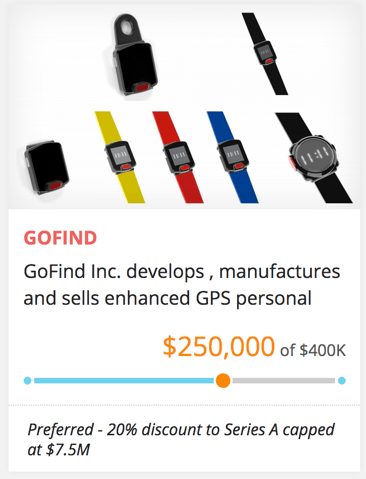
Recent Success
Y-Combinator grad Acre Homes of Mountain View, Calif., raised over $5 million in two rounds on Crowdfunder.
Microventures
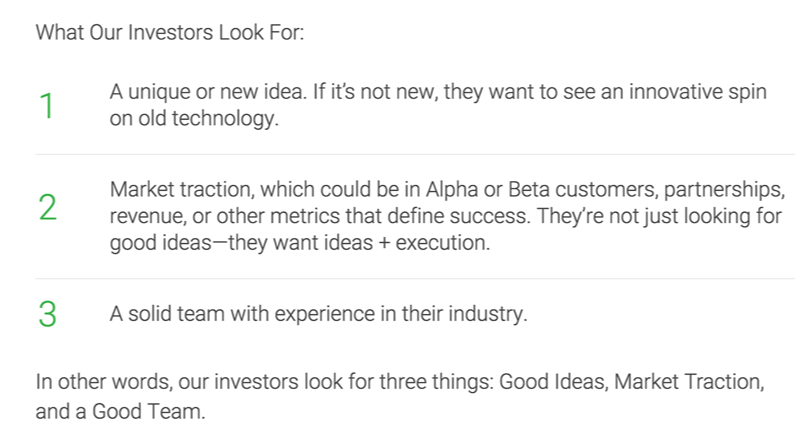
Indiegogo’s partner in its First Democracy VC equity platform, Microventures also has its own equity crowdfunding site—and it’s one of the oldest around (circa 2011). Microventures hosts bigger deals where investors contribute as little as $100, pooling their money into Microventures’ single investment in the startup. It’s done 350+ deals, raising $160 million. Another $12 million has gone to startups in regulation crowdfunding deals.
Microventures is one of the few equity U.S. crowdfunding platforms that is a registered broker-dealer, a needed designation to work with accredited investors, says founder Bill Clark. This enables a more sophisticated investor pool.
The site concentrates mainly on startups in seven industries: mobile, gaming, social, IT, media/entertainment, software, and green tech. Companies raising $150,000–$1 million are typical here.
Fees
It’s a 5% fee if you do Regulation D crowdfunding (big money from accredited investors). There’s no fee on regulation crowdfunding.
Features
Microventures has a useful education section on the various types of crowdfunding, debt vs. equity, convertible notes, and more.
Like a few other crowdfunding websites, Microventures has a secondary market for reselling equity shares. The platform is highly selective—recently, just three deals were in progress.

Bill Clark, Microventures
“We want to do more filtering,” Clark says. “We only accept about 1% of applications.
“We’ve been doing this 7 years, and at this point, there are deals we look at and say, ‘There’s no way there’s an exit here.’ Usually, we’re not the first money in—they’ve raised money in some aspect before.”
Recent Success
Past campaigns are hidden… but autonomous-drone startup Matternet went on from its Microventures success to raise $18 million in venture capital in 2018.
Netcapital
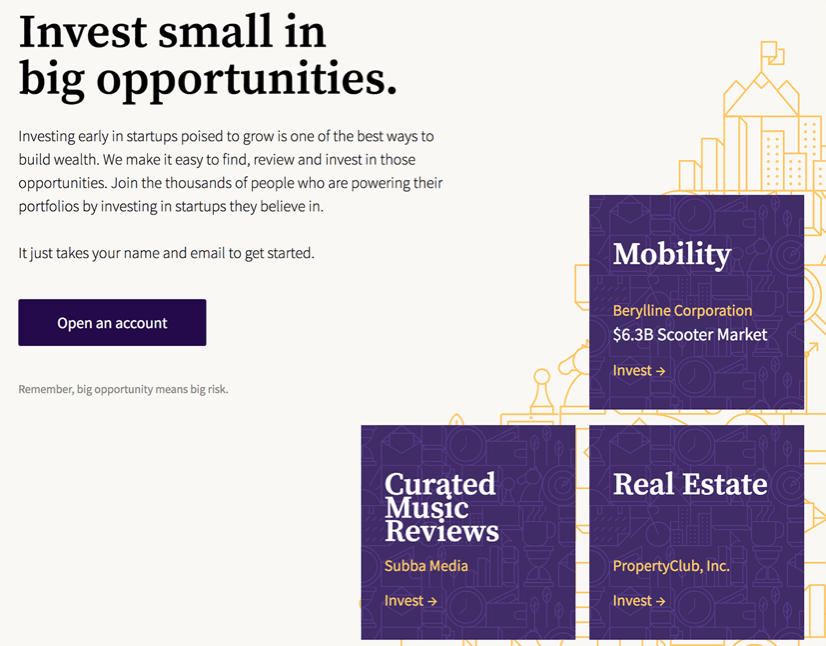
This is the equity platform for the masses. Netcapital investors can get in with just 10 cents (though $725 is average). There’s a 70% success rate and 36 completed deals. A typical raise is around $100,000.
Only U.S. companies can play. Recently, eight campaigns were in progress. Netcapital mostly does deals for company stock, a/k/a equity shares.
Fees
A 4.9% success fee includes a lot of services, such as a complimentary 100-point inspection, transaction and escrow fees, coaching, and paperwork prep.
Features
Netcapital makes all deal specs visible without registering, so it’s easy to browse. If you don’t want teeny-tiny investments, you’re free to set a minimum amount for investors.
Recent Success
Interactive-tech firm Atmos Digital shot past a $10,000 goal to raise $50,000.
NextSeed
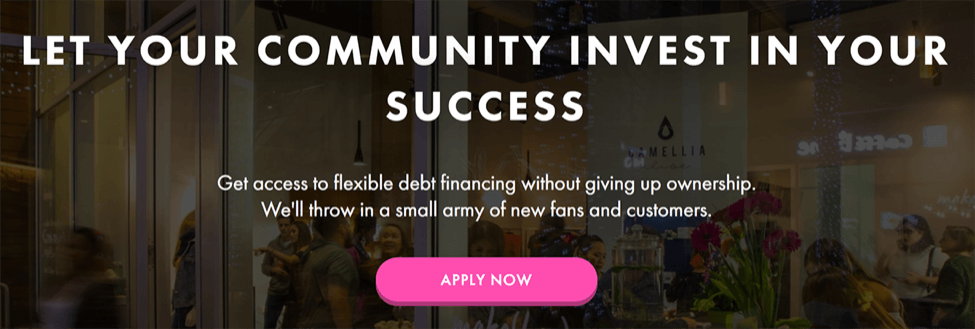
Is your startup a brick-and-mortar or food business already making reliable money? If so, NextSeed could help you raise funds from $100 investors—without giving up an ownership stake.
A rare bird among equity crowdfunding sites, NextSeed specializes in term loans and revenue-share deals, so you give up no ownership stake. The latter means you’ll pay back investors out of a percentage of your startup’s monthly revenue.
Startups can raise $50,000–$1 million here, with terms from 2–4 years. Interest rates range from 10% to 18%, depending on how much cash flow you’ve got, your credit score, and loan duration.
Fees
There’s a $500 loan-setup fee, plus a success fee of between 5% and 10%.
Features
NextSeed says their average time to successful raise is just three weeks—so this could be a speedy cash injection.
Another plus: VentureBeat recently reported NextSeed had a 93% success rate, one of the industry’s highest. Seven deals were active recently.
Recent Success
Texas-based beer distributor Wichita Falls Brewing Co. raised $125,000 from 152 investors.
RocketHub
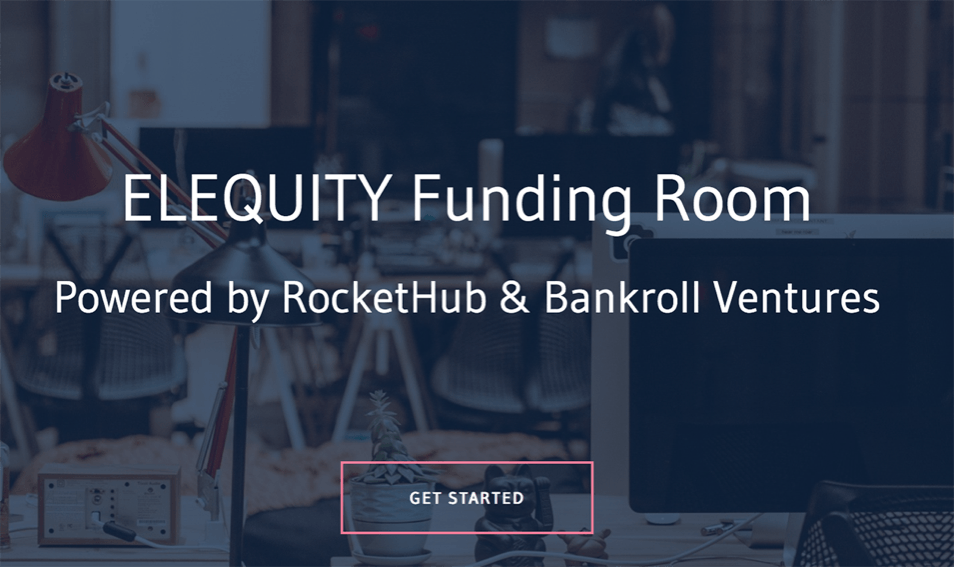
Marching to a different drummer, RocketHub bills itself as a “social network for entrepreneurs.” Crowdfunding is just one of their activities, along with networking, live events, and site advertising. They partner with Bankroll Ventures on an equity crowdfunding site; their joint crowdfunding platform is known as Elequity.
Fees
Not stated on the site. Requests for information weren’t met.
Features
You have to set up a profile to see details on RocketHub’s equity crowdfunding—so I did. Here’s what they’re looking for in a startup (along with some pithy tips for crowdfunding entrepreneurs):
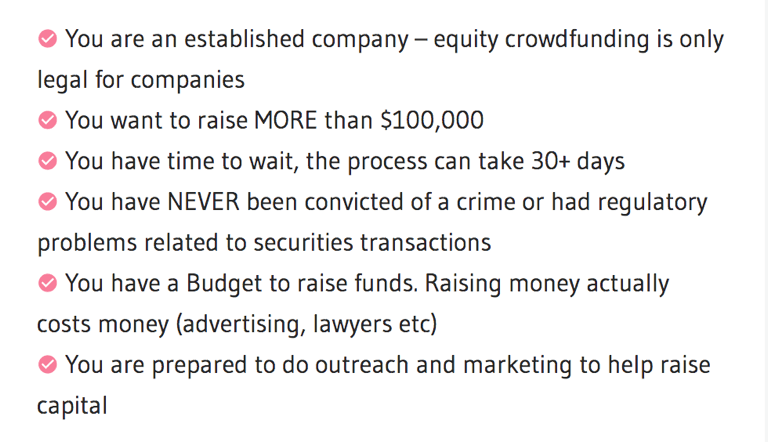
Revealed: RocketHub offers crowdfunding under all three SEC rules, and in the form of debt, equity, or convertible note. Active campaigns are hidden.
Despite appearing on quite a few ‘top platforms’ lists online, RocketHub has a decidedly clunky interface. You’d have to register as an investor to see current campaigns.
Note: There are negative reviews on RocketHub bouncing around online. So be cautious. It might be a place to network and learn before you try their crowdfunding.
Recent Success
RocketHub helped BrewDog, a Scottish craft-beer brand, raise $7 million of a $50 million goal in a sassy “equity for punks” campaign that attracted 46,000 investors.
Republic
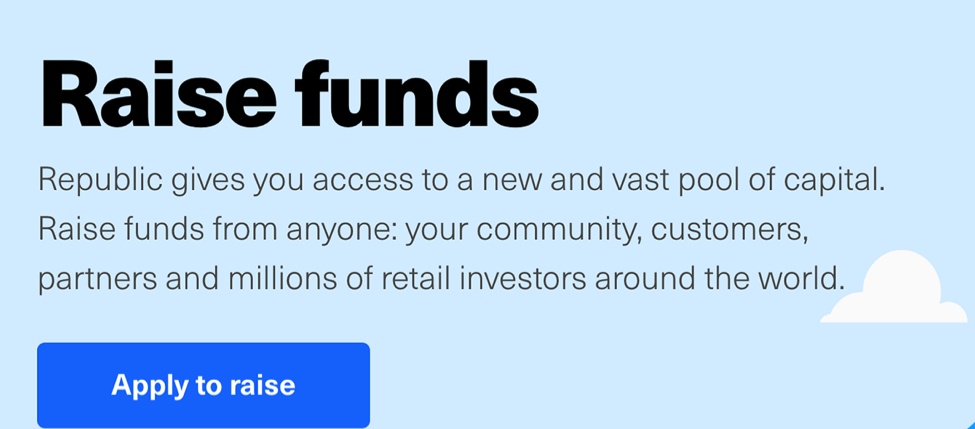
With its $10 investor minimum, Republic brings equity crowdfunding to the masses. The emphasis here is on getting money to entrepreneurial women, veterans, and minorities, all of whom usually don’t see much investor money.
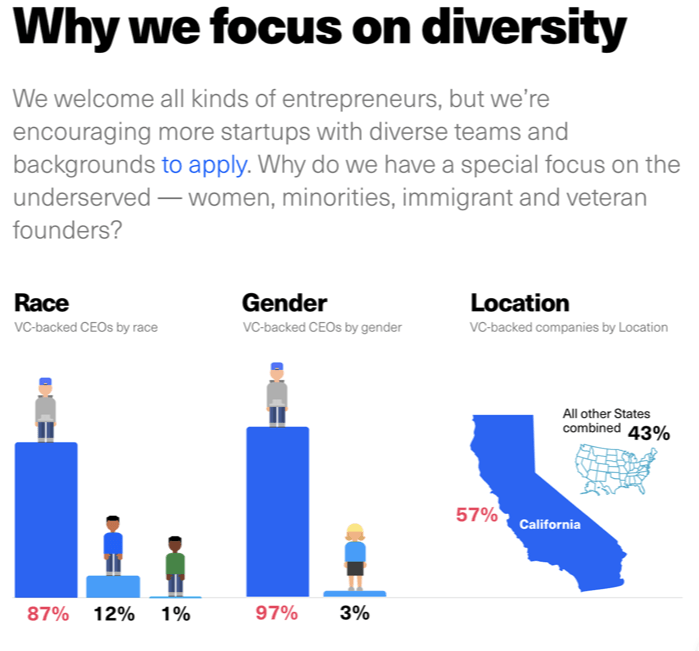
The site claims a 95% success rate with 52 funded campaigns. Recently, six campaigns were active. Or really, they were on fire—most were over 200% funded or more.
The platform does equity crowdfunding in the form of Republic’s exclusive, flexible Crowd SAFE. The SAFE gives investors the right to purchase shares in future.
Fees
Fees are 6% of the total raised, plus 2% of any securities offered. Republic is investing along with its investor pool, in each deal. If you wonder what it costs to do equity crowdfunding paperwork, legal, marketing, the works—Republic has a useful breakdown.
Features
Cryptocurrency offerings are big here, along with tech. You can see a list of campaigns, including previous ones, by mousing over the “investor” tab.
As a bonus, Republic comes from the same people who’re behind top industry site AngelList. These folks have investor connections.
Recent Success
RMR Laboratories raised $785,000 for its cannabis cream.
SeedInvest
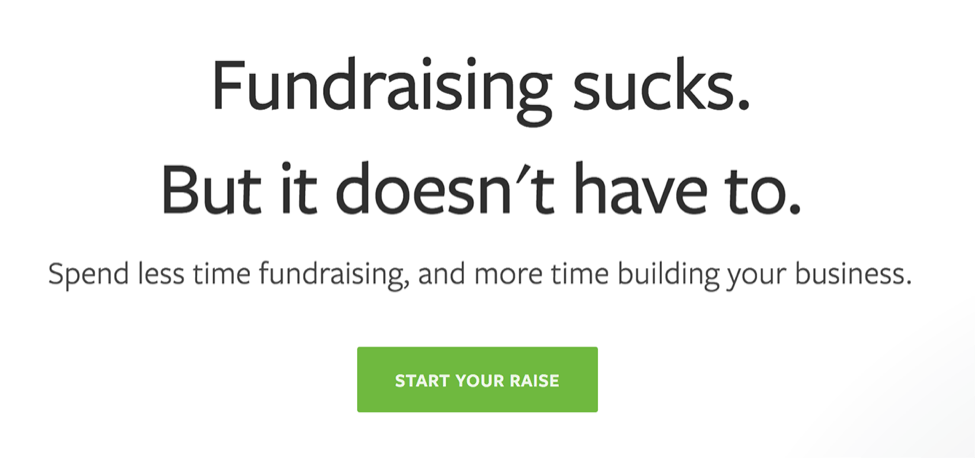
This one’s for entrepreneurs who want to raise big: SeedInvest boasts the highest average per-campaign totals in equity crowdfunding, at over $435,000, VentureBeat recently found.
With a $200 investor minimum, SeedInvest has $115 million invested in startups. Campaigns typically take 45 days. Be amazing—this is a highly selective platform.
Fees
SeedInvest takes a 7.5% placement fee, plus 5% in equity for itself, investing along with the crowd. They’ve got a handy calculator where you can figure your possible fees.
Features
There’s a “test the waters” phase. Investors are drawn to SeedInvest’s auto-invest feature, which allows them to invest in many startups on autopilot, spreading their risk. If your campaign hits its targets, you’re added to the auto-invest pool.
Recent Success
Rising fast-fashion denim brand DSTLD raised nearly $3 million on SeedInvest.
P2P Crowdfunding Platforms
Funding Circle

Welcome to peer-to-peer crowdlending headquarters! Funding Circle leaves many other ‘best crowdfunding sites in P2P’ in the dust in terms of size. Better yet, it’s completely small-business focused, which makes it the best crowdfunding website for business crowdlending (most P2P sites only offer business funding as a sideline). It’s midwifed $7 billion in loans to over 51,000 startups worldwide.
Interest rates range between 4.99% and 25.99%, and you can borrow $25,000–$500,000. Repay in 6 months… or 5 years.
Fees
Loan origination fees range from .99% to 6.99%. Don’t be late on a loan payment—they’ll charge you 5%. There are no prepayment penalties.
Features
Investors here are heavy hitters—it’s a minimum $250,000 commitment for them.
Funding Circle is so successful, in September 2018, it was planning its own IPO, expecting to raise £300 million. That may bring a cash infusion and even more lending.
Campaigns are hidden in crowdlending, unless you’ve registered as an investor.
Lending Club

At Lending Club, entrepreneurs compete for investor attention with individuals who want personal or auto refinancing loans. In all, Lending Club has seen $28 billion in loans made.
They don’t say how much of that is in business loans, but they’re definitely a major focus.
Rates for good borrowers start at 5.99%, with loan terms of 1–5 years. Watch out, because annualized interest can be as high as 35.71%. A typical monthly payment is $227–$955.
Here’s a quick snapshot of what you need for crowdlending on Lending Club—it’s not a place for zero-revenue, brand-new startups:

Fees
Your loan fees will range from 1.99% to 8.99%. No prepayment penalties.
Features
You get a “client advisor” to work with here, and fast approvals. Lending Club is a publicly traded company (NYSE: LC), so you can check out their financial statements for more.
Lending Club has a collection of business-owner customer stories here.
StreetShares

Founded by two U.S. military veterans near Washington, D.C., StreetShares has a special mission none of the other crowdfunding sites share: to help veteran-owned businesses (but any qualified entrepreneur can borrow). They’ve funded over $100 million in business loans.
Fees
Loan fees range from 3.95% to 4.95%. Interest rates aren’t posted, but they do provide a handy collection of loan calculators. Requests for more details got no response.
Features
StreetShares has three kinds of financing for businesses:
- Term loans of $2,000 to $250,000 with terms of 3 to 36 months
- Revolving business lines of credit from $5,000 to $250,000
- No-limit contract financing (also known as a purchase-order or factor loan) to help government-contractor companies fulfill their projects
An appealing angle that may lure investors: StreetShares packages its loans into Veteran Business Bonds at a guaranteed 5% return—a great rate on a U.S. 1-year bond these days.
See StreetShares’ success stories near the bottom of this page.
UpStart
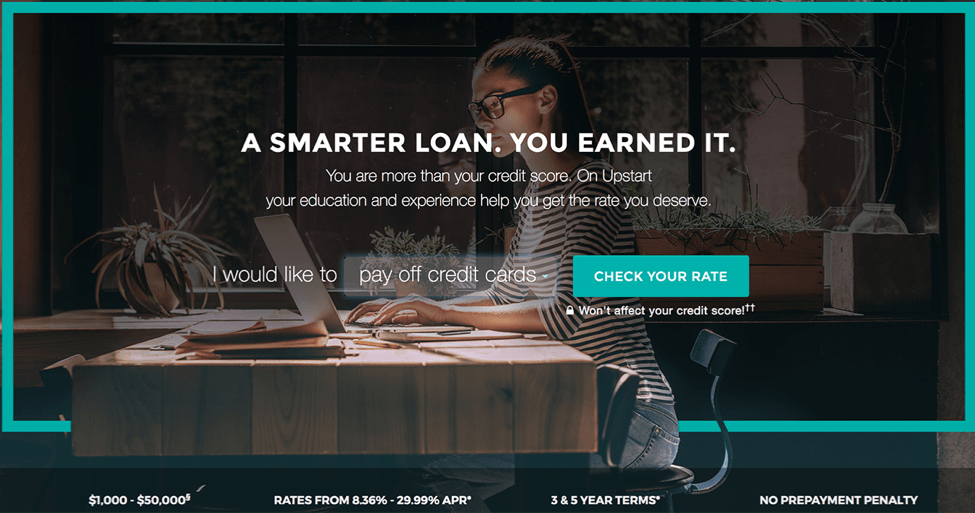
Fast-growing UpStart has made $2.3 billion in (mostly personal) loans. You can borrow $1,000–$50,000 here in 3- or 5-year term loans, at 8.36%–29.99% interest.
Founded by ex-Googlers, UpStart uses more data points than just your credit score to determine your interest rate. They factor in education, job history, lack of past defaults, and more to create a complete picture of your creditworthiness. The result, a recent study showed, is that UpStart has a much lower default rate than its competitors:
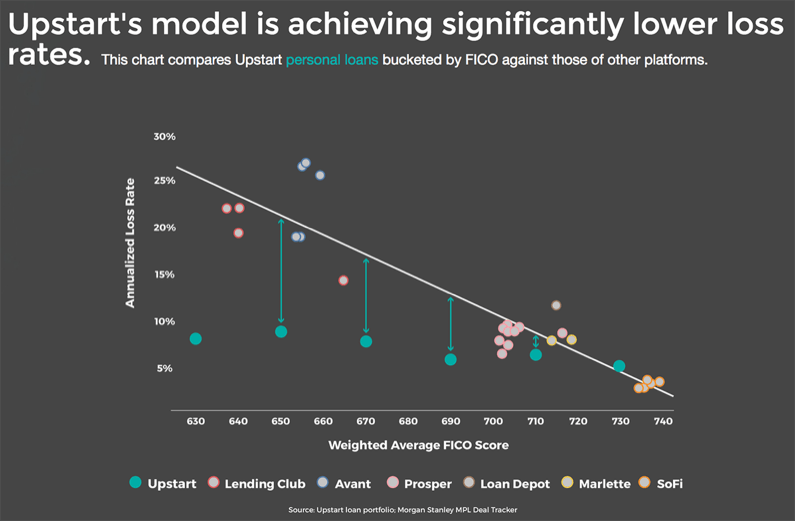
Fees
Between 0% and 8% origination fee. There’s a 5% late fee, but no prepayment penalties.
Features
This is primarily a personal-loan platform—business loans are literally the last of all their borrowing options, listed under “other.” But if you’ve never defaulted before, don’t have other recent loans, went to college, and have a strong job history, UpStart might give you a great rate.
UpStart doesn’t show success stories or current loans in progress publicly on its site.
Beyond the Biggies: Consider Niche Crowdfunding Websites

The top 20 listings above gave you a tour of the biggest, best crowdfunding sites of all types. But no list of crowdfunding platforms would be complete without mentioning the emerging world of niche crowdfunding websites. These may not be as well known or popular—but they could be where your business finds success.
For instance, Women You Should Fund is an option for women entrepreneurs. Experiment (seen above) helps fund the sort of scientific research that powers many biotech and medical startups. Seed & Spark focuses on film and TV projects, while PledgeMusic funds bands.
Finally, for those who know the web-application framework Ruby on Rails, there’s the customizable platform SelfStarter, which bills itself as “Roll Your Own Crowdfunding.” Depending on your startup’s industry and team skills, a specialized crowdfunding platform might be a better choice for you. (Coming up in Chapter 4, check out why Canadian financial-services startup Hardbacon chose GoTroo for an equity crowdfunding round, for instance.)



Crowdfunding Websites For Every Entrepreneur
There you have it—20 best crowdfunding sites and more. As you can see, crowdfunding platforms come in many flavors. Hopefully, this crowdfunding website list has given you a taste of all the different models sites use, and helped you decide which crowdfunding website to use for your startup.
[highlight]Big tip: Choosing one of the more established, popular crowdfunding sites will usually mean greater exposure and better support. [/highlight]
Ask lots of questions before you commit, and do your own crowdfunding websites comparison—these sites evolve over time. Then, choose the best option for your startup’s situation. Done right, crowdfunding can transform your business and skyrocket your growth.
Now that you know the best crowdfunding sites on which to run your own fundraising campaign, let’s take a look at how crowdfunding helps startups specifically—and how to make it successful for your business.

